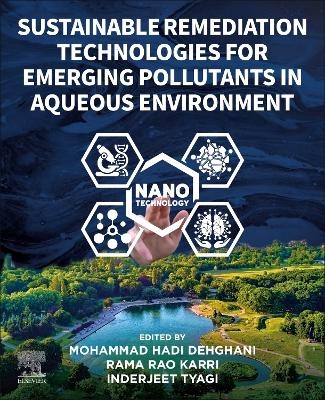
Sustainable Remediation Technologies for Emerging Pollutants in Aqueous Environment
Elsevier - Health Sciences Division (Verlag)
978-0-443-18618-9 (ISBN)
Prof. Dr. Mohammad Hadi Dehghani is a Full Professor at the Tehran University of Medical Sciences (TUMS), School of Public Health, Department of Environmental Health Engineering, Tehran, Islamic Republic of Iran. His scientific research interest includes environmental science. He is an editorial board member, guest editor, and reviewer in many internal and international journals and is a member of several international science committees around the world. He has authored or edited 16 books and more than 230 full papers published in peer-reviewed journals. Dr. Rama Rao Karri is a Professor (Sr. Asst) in the Faculty of Engineering, Universiti Teknologi Brunei, Brunei Darussalam. He has a Ph.D. from the Indian Institute of Technology (IIT) Delhi, Master’s from IIT Kanpur in Chemical Engineering. He has worked as a Post-Doctoral research fellow at NUS, Singapore for about six years and has over 18 years of working experience in Academics, Industry, and Research. He has experience of working in multidisciplinary fields and has expertise in various evolutionary optimization techniques and process modelling. He has published 150+ research articles in reputed journals, book chapters, and conference proceedings with a combined Impact factor of 611.43 and has an h-index of 28 (Scopus - citations: 2600+) and 27 (Google Scholar -citations: 3000+). He is an editorial board member in 10 renowned journals and a peer-review member for more than 93 reputed journals and has peer-reviewed more than 410 articles. Also, he handled 112 articles as an editor. He also has the distinction of being listed in the top 2% of the world’s most influential scientists in the area of environmental sciences and chemicals for the Years 2021 & 2022. The List of the Top 2% of Scientists in the World compiled and published by Stanford University is based on their international scientific publications, the number of scientific citations for research, and participation in the review and editing of scientific research. He held a position as Editor-in-Chief (2019-2021) in the International Journal of Chemoinformatics and Chemical Engineering, IGI Global, USA. He is also an Associate editor in Scientific Reports, Springer Nature & International Journal of Energy and Water Resources (IJEWR), Springer Inc. He is also a Managing Guest editor for Spl. Issues: 1) “Magnetic nanocomposites and emerging applications", in Journal of Environmental Chemical Engineering (IF: 5.909), 2) “Novel CoronaVirus (COVID-19) in Environmental Engineering Perspective", in Journal of Environmental Science and Pollution Research (IF: 4.223), Springer. 3) “Nanocomposites for the Sustainable Environment, in Applied Sciences Journal (IF: 2.679), MDPI. He along with his mentor, Prof. Venkateswarlu is authoring an Elsevier book, “Optimal state estimation for process monitoring, diagnosis, and control. He is also co-editor and managing editor for 8 Elsevier, 1 Springer and 1 CRC edited books. Elsevier: 1) Sustainable Nanotechnology for Environmental Remediation, 2) Soft computing techniques in solid waste and wastewater management, 3) Green technologies for the defluoridation of water, 4) Environmental and health management of novel coronavirus disease (COVID-19), 5) Pesticides remediation technologies from water and wastewater: Health effects and environmental remediation, 6) Hybrid Nanomaterials for Sustainable Applications, 7) Sustainable materials for sensing and remediation of noxious pollutants. Springer: 1) Industrial wastewater treatment using emerging technologies for sustainability. CRC: 1) Recent Trends in Advanced Oxidation Processes (AOPs) for micro-pollutant removal. Dr. Inderjeet Tyagi is working as a Scientist at ZSI, Ministry of Environment Forest and Climate Change, Kolkata, India. To his expertise, Dr. Tyagi is working in the field of Wastewater treatment, Water Quality, Environmental Metagenomics, and Environmental Management for the past several years. To his credit, Dr. Tyagi had published 120+ SCI papers with Citation~8600 and an h-index of 51 with a cumulative impact factor >550. More to this, he is leading Five (5) national and international projects related to wastewater and water quality assessment in heavily polluted areas in India. Further, he is also on the reviewer panel of more than 40 international journals belonging to well-known publishers like Elsevier, Nature, Springer Nature, Taylor Francis, ACS, etc. Recently, he was awarded the “India Prime Education Quality Award 2021 for his outstanding contribution to the field of wastewater treatment and Environmental Management. He is a lifetime member of the Indian Science Congress Association (ISCA) and a Member of the International Society of Wetland Scientists (International Chapter). He is the Editor of One Elsevier edited book entitled “Sustainable Materials for Sensing and Remediation of Noxious Pollutants
Part 1. Emerging pollutants in water and wastewater and health effects 1. Emerging pollutants in water and wastewater
Part 2. Biological purification technology 2. Fundamentals and mechanism of biological purification and classification
Part 3. Fundamentals and mechanism of adsorption 3. Adsorption process
Part 4. Types of adsorbents and its adsorption mechanism 4. Natural adsorbents 5. Carbon based adsorbents 6. Metal based adsorbents 7. Waste based adsorbents 8. Bio-sorbents 9. Other significant categories of adsorbents 10. Desorption / regeneration of adsorbents and their performance
Part 5. Membrane technology 11. Fundamental of Membrane and classification
Part 6. Advanced oxidation processes 12. Advanced oxidation processes 13. Homogeneous processes 14. Heterogeneous processes 15. Techno-economic assessment
| Erscheinungsdatum | 03.08.2023 |
|---|---|
| Verlagsort | Philadelphia |
| Sprache | englisch |
| Maße | 191 x 235 mm |
| Gewicht | 1070 g |
| Themenwelt | Naturwissenschaften ► Biologie ► Mikrobiologie / Immunologie |
| Naturwissenschaften ► Chemie ► Technische Chemie | |
| Technik ► Umwelttechnik / Biotechnologie | |
| ISBN-10 | 0-443-18618-9 / 0443186189 |
| ISBN-13 | 978-0-443-18618-9 / 9780443186189 |
| Zustand | Neuware |
| Informationen gemäß Produktsicherheitsverordnung (GPSR) | |
| Haben Sie eine Frage zum Produkt? |
aus dem Bereich


